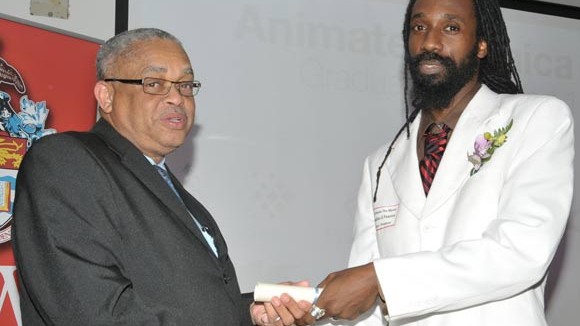

Can Jamaica Become A Force in Global Animation?
Animation may not be the first thing that pops to mind when you hear the name Jamaica, but the Caribbean island of nearly 3 million people is making an effort to position itself as a player in the global animation industry. Two weeks ago, 43 students graduated from the inaugural class of ‘Animate Jamaica,’ a six-month certificate program of the Caribbean Institute of Media and Communication. [The graduation photo above comes from this set on Flickr.]
The program has garnered enthusiasm in Jamaican media as a possible solution for easing the country’s perpetual unemployment problem for young people. Animate Jamaica has the backing of both Jamaica’s government and the World Bank Group. The initiative’s lofty aims, according to the World Bank, is to position Jamaica “as one of the global hubs of animation with South Korea, India, and the Philippines as a means of tapping into the significant creative talent of Jamaican youth and their interest in participating more actively in the global economy.”
Nearly two-thirds of the graduating students have already been guaranteed work, in part due to the Jamaican studio Reel Rock GSW, which was a major backer of the Animate Jamaica program. They signed a co-production deal last year with French animation outfit Red Frog to produce 13 episodes of Quiz Time for Disney Junior France [see video below]. The success of that production has led to an even bigger co-production deal to work on 52 episodes of the Disney Channel/Nickelodeon series Lucky Fred in conjunction with Spain’s Imira Entertainment.
Jamaica, which is an economically troubled country, obviously cannot invest the tens (and hundreds) of millions of dollars that Asian countries like Singapore spend to build technology infrastructure and develop artists for their entertainment industry. Jamaica is building a stealth animation industry with minimal resources and investment, and by that standard, it is remarkable how much progress they have made in such a brief period of time. Reel Rock was founded just two years ago. The Animate Jamaica training program was conceived only last June at the Kingstoon animation conference held in Kingston, Jamaica. The students are now trained in Toon Boom Harmony, an industry-standard software that Reel Rock uses to produce their work. Montreal-based Toon Boom has been involved from the beginning, backing the Animate Jamaica program and providing support to Reel Rock.
The creative/entertainment sector was not an option for most global youth a couple decades ago. Today, with standardized software and a pre-existing familiarity with Hollywood standards, youth in developing countries like Jamaica can join the global animation marketplace almost immediately. If animation history in other parts of the world is any guide, the most talented and savviest of Jamaica’s young animators will set out to launch their own studios. And just like that, an animation industry is born in a place where one did not previously exist. Developing countries that wish to launch their own animation industries would be wise to track the progress of the Jamaican model and its evolution over the next few years.

